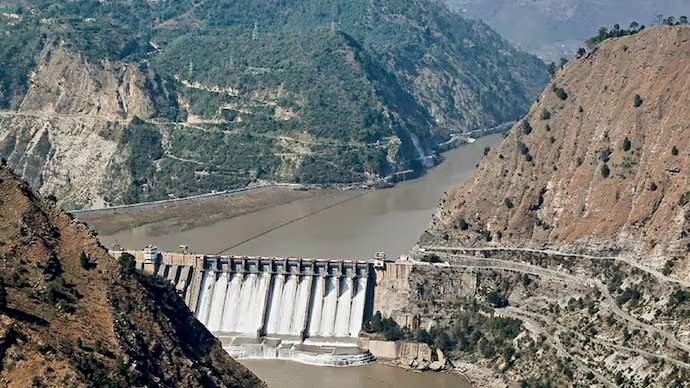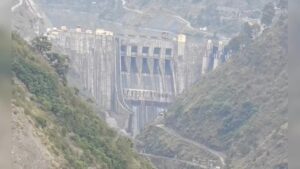New Water War? India Halts Chenab River Flow to Pakistan
India sends stern message to Pakistan following Pahalgam terror attack by temporarily stopping Chenab river flow through Baglihar Dam; similar move could follow at Kishanganga.

Srinagar, May 5:
In a firm diplomatic gesture after the Pahalgam terror attack that killed 25 tourists and a local resident, India has temporarily stopped the flow of water from the Baglihar Dam on the Chenab River — a step considered a warning to Islamabad in the midst of growing bilateral tensions.
This follows New Delhi announcing the suspension of the Indus Waters Treaty, the longstanding water-sharing agreement between the two countries, citing Islamabad’s alleged sponsorship of cross-border terrorism.
According to top government officials, even as the shutdown of water by the Baglihar Dam is only temporary — due to the technical constraints in storage — it represents a symbolic increase in the intensity of Indian action to apply pressure without confronting Pakistani troops militarily. The Centre is also said to be considering similar measures at the Kishanganga Dam in Bandipore district.
The Baglihar project, a 900-MW run-of-the-river hydroelectric power plant in Jammu and Kashmir’s Ramban district, follows the technical provisions of the Indus Waters Treaty. But its temporary storage of water — prior to compulsory release — has now been utilized as an instrument of political communication.
The Chenab River, which is a “western river” under the treaty, is supposed to flow freely into Pakistan. India holds the right to use its waters for non-consumptive uses like hydroelectric power generation and irrigation but not for storage or diversion.
The latest action, however, renewed long-standing concerns of Pakistan. Islamabad has remained steadfast in their objection to the Baglihar and Kishanganga hydropower plants, claiming both projects contravened the intentions of the agreement and could place strategic advantage within India’s favor during hostilities.
Earlier arbitration by the World Bank — a signatory to the treaty — produced conflicting verdicts. Though some of Pakistan’s complaints over the design of the Baglihar Dam were accepted, principal concerns over dam height and spillway gates were rejected. Likewise, in the Kishanganga case, the Court of Arbitration sided with New Delhi, permitting India to divert water between tributaries — an issue of huge contention.

Diplomatic relations between the two nations have been quiet since the horrific Pahalgam attack, commonly blamed on Pakistan-sponsored militant outfits. Prime Minister Narendra Modi, in a highly charged speech, denounced the attack as an attack on India’s soul. “This attack was not only on innocent tourists; the enemies of the country have had the temerity to attack India’s soul,” he stated, promising an “unimaginable punishment” for the attackers.
Pakistan has retorted with customary ire, threatening that any move to limit water flow would be interpreted as a provocation to war and that it will scupper bilateral arrangements — including the historic Simla Accord, which regulates the Line of Control.
Though the Baglihar Dam cannot be a long-term closure because of its run-of-the-river setup, experts note that water has the potential to become the next flashpoint in South Asia’s unstable geopolitical matrix.







One Comment